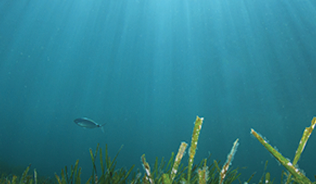Coral reefs are alive with sound. Fish and invertebrates create a symphony of snaps, whistles, pops, chirps and grunts which they use to communicate, detect danger and food, choose a mate and find a home. But degradation alters reef soundscapes, with concerning consequences. Young fish are usually attracted to reefs by sound, replenishing populations as they settle, but degraded soundscapes have reduced attractiveness to young fish, potentially jeopardising this process.
In this webinar, Tim Gordon Marine Biologist based at the University of Exeter and the Australian Institute of Marine Science shares his research on how bioacoustic approaches are showing promise as novel tools for reef management; we can use hydrophones to monitor reef health and underwater loudspeakers to attract juvenile fish to degraded habitat. In a world where reefs are changing at unprecedented rates, much can be achieved by learning to listen.





